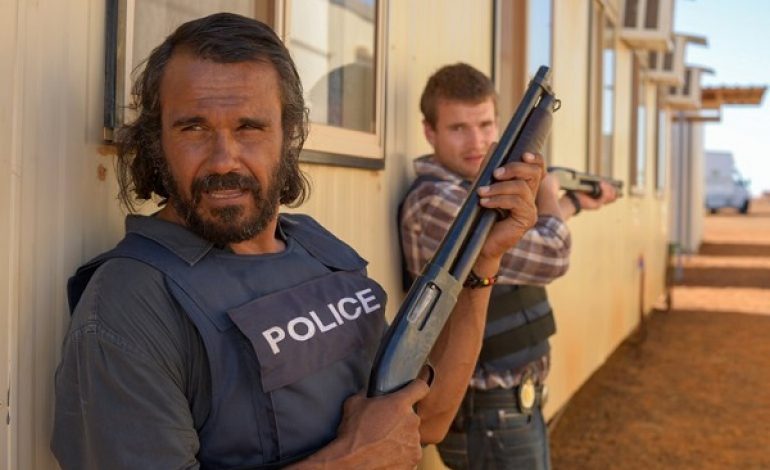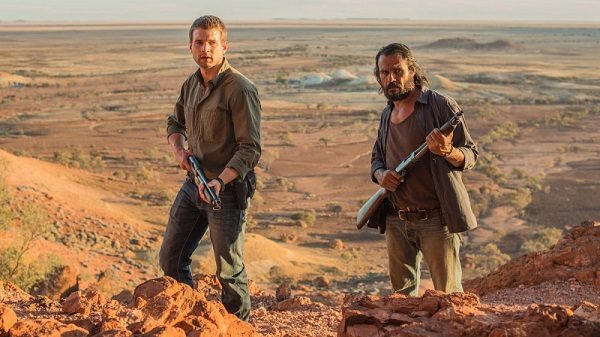

Australian ‘multi-threat’ filmmaker Ivan Sen successfully tackles the Western and film noir in his latest work, Goldstone. As the writer, director, composer, editor, and cinematographer, Sen uses the desolation of Queensland as the backdrop to a missing person/murder mystery. Set in a corrupt mining town at the edge of nowhere, Goldstone features end-of-his-luck Indigenous detective Jay Swan (Aaron Pedersen) enlisted to find a missing tourist.
As the story is bound to go, Swan finds himself embroiled in a town so corrupt that it’s a wonder anyone gets out alive. The Mayor is in on it. The mining company is in on it. The cops are in on it. It’s a town populated by miscreants whose favorite (only?) pastime is an Asian brothel that relishes in sex trafficking and the constant emotional and physical abuse of its prostitutes. However, with roots in both the Western and noir genres, Goldstone being the definitive “town without pity” fits. Though Goldstone has an occasional tendency to cross the line of a bit too conspiratorial, too evil, to Sen’s credit, its seediness feels real and lived in for the most part. However, while you can give the film some leeway as a Western noir, overall it often relies too heavily on the tropes without doing anything unique or different with them.
As with many in the genre(s), Goldstone‘s success or failure depends on the lead, and Swan carries the movie. The stock protagonist, he is a disheveled alcoholic constantly trying to run from his tragic past. As played by Pedersen, he is easily the film’s most compelling character. Pedersen imbues him with a weariness and sense of loss that follows him wherever he goes. He might be able to obtain justice, but he will never be fulfilled. Swan’s Indigenous heritage further provides him with an edge that would otherwise be missing in this role. The best parts of the movie are the ones that delve into him considering how he is among the last of a dying culture. The racism he faces from all groups and perpetually feeling out of place no matter where he goes obviously allows him to connect to the victims, but as an actor Pedersen maneuvers through this aspect in a subtler, defter way than the rest of the movie manages. (You can understand how he won Best Actor at the Film Critics Circle of Australia and the Australian Film Critics Association last year.)


The rest of the cast isn’t nearly as exceptional or complex. Animal Kingdom’s Jackie Weaver continues her trend of terrific snakeish roles, this time as as Goldstone’s Mayor Maureen. She’s a master at being equally soothing and threatening, but in this her malice is a bit too obvious for someone who should at least trying to be putting on a pleasant public facade. She might offer baked goods, but there must be a way to warn people off an investigation without it arousing even more suspicion. Or maybe her stranglehold over Goldstone is so strong she doesn’t care who knows.
Alex Russell plays a young police officer who initially sides with the warped values of Goldstone before switching sides and joining Swan. It’s a standard character in a film like this, but he’s a bit too naive even with that allowance. He shouldn’t be that surprised that a brothel of Asian prostitutes in a mining town in the middle of nowhere Australia isn’t on the up and up. David Wenham of Iron First and Lord of the Rings is okay in a mostly thankless part as a a mining manager/Maureen’s lackey. The performances are actually fine, it’s the writing and obvious characterization that lets them down.
The true highlight of the film though is its cinematography. Even when the movie falters, Sen’s visual acumen never does. This movie consistently provides picturesque shots of some of Australia’s hottest, harshest vistas. Goldstone is an isolated wasteland that seems to exist in its own bubble, and the unforgiving wilderness rightfully takes center stage.
Of interest, Swan is a carry over from Sen’s previous film Mystery Road, although Goldstone functions perfectly well as a stand-alone sequel. I’ve never seen Road, but I am now tempted to seek out, which might be the best testament to this film’s quality.
Verdict: 3 out of 5
Goldstone might rely too heavily on conventional noir tropes, but a terrific lead and wondrous cinematography sets it above. And besides, after such terrible modern neo-noirs in Mute and Altered Carbon, it’s a welcome change of pace to see someone handle the genre well.
